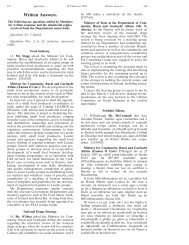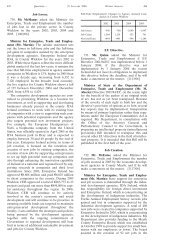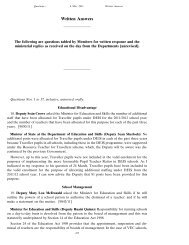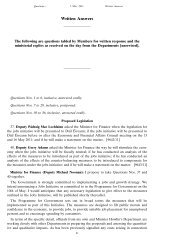Written Answers. - Parliamentary Debates - Houses of the Oireachtas
Written Answers. - Parliamentary Debates - Houses of the Oireachtas
Written Answers. - Parliamentary Debates - Houses of the Oireachtas
Create successful ePaper yourself
Turn your PDF publications into a flip-book with our unique Google optimized e-Paper software.
Questions— 14 February 2012. <strong>Written</strong> <strong>Answers</strong><br />
mission Proposal on TACs and quotas for 2012 to <strong>the</strong> Dail. This assessment set out my strategy<br />
for <strong>the</strong> negotiation <strong>of</strong> Ireland’s quotas. Following intensive negotiations at <strong>the</strong> December EU<br />
FisheriesCouncil TACs and quotas were established which protected <strong>the</strong> Irish fishing industry<br />
while respecting <strong>the</strong> most up-to-date scientific data for priority stocks <strong>of</strong> critical importance to<br />
our fleets.<br />
Fish quotas are managed each year in close consultation with industry representatives.<br />
In relation to <strong>the</strong> monthly allocation <strong>of</strong> whitefish stocks, my Department <strong>of</strong>ficials and <strong>the</strong><br />
representative producer organisations in <strong>the</strong> industry, both fishermen and onshore processors,<br />
meet each month to make recommendations to me in relation to <strong>the</strong> quota to be allocated in<br />
<strong>the</strong> coming month.<br />
When making decision on <strong>the</strong> policy governing <strong>the</strong> allocation <strong>of</strong> pelagic stocks, such as<br />
mackerel and herring, an extensive consultation process is undertaken. These consultations<br />
provide <strong>the</strong> opportunity for those involved in <strong>the</strong> industry, to highlight <strong>the</strong>ir concerns and make<br />
recommendations concerning <strong>the</strong> policy. This is <strong>the</strong> process which was used to determine <strong>the</strong><br />
polyvalent mackerel policy, <strong>the</strong> boarfish policy and <strong>the</strong> revised herring policy which is nearing<br />
conclusion.<br />
Proposed Legislation<br />
574. Deputy Michael Healy-Rae asked <strong>the</strong> Minister for Agriculture, Food and <strong>the</strong> Marine<br />
his proposals regarding <strong>the</strong> criminalisation Bill being removed with regard to our fishing industry.<br />
[8263/12]<br />
Minister for Agriculture, Food and <strong>the</strong> Marine (Deputy Simon Coveney): The Programme<br />
for Government committed to replacing <strong>the</strong> criminal sanctions system for minor fisheries<br />
<strong>of</strong>fences with administrative sanction system to bring Ireland into line with o<strong>the</strong>r European<br />
jurisdictions.<br />
I sought <strong>the</strong> advice <strong>of</strong> <strong>the</strong> Attorney General on <strong>the</strong> matter. The Attorney General has<br />
responded with a detailed advice on <strong>the</strong> issue which I am currently examining. The advice<br />
highlights <strong>the</strong> difficulties in relation to <strong>the</strong> Constitution and in relation to <strong>the</strong> laws <strong>of</strong> <strong>the</strong><br />
European Community relevant to <strong>the</strong> question <strong>of</strong> implementing a system <strong>of</strong> administrative<br />
sanctions for fisheries.<br />
There are many significant differences between <strong>the</strong> legal systems in Ireland and that <strong>of</strong> o<strong>the</strong>r<br />
EU Member States. Ireland’s constitutional and legal position provides certain basic rights<br />
which must be respected within our system <strong>of</strong> justice. Fur<strong>the</strong>rmore, European Union legislation<br />
requires that penalties for fisheries <strong>of</strong>fences must be “effective, proportionate and dissuasive”.<br />
That is, <strong>the</strong>y must act as a deterrent and <strong>the</strong>y must also ensure that <strong>the</strong>re is no benefit gained<br />
by infringing <strong>the</strong> rules.<br />
Given <strong>the</strong> nature <strong>of</strong> <strong>the</strong> penalties involved, <strong>the</strong>re is a general requirement under <strong>the</strong> Constitution<br />
that alleged breaches <strong>of</strong> fisheries control regulations must be tried in a court <strong>of</strong> law. I<br />
am continuing to actively examine <strong>the</strong> issue in <strong>the</strong> context <strong>of</strong> <strong>the</strong> Attorney General’s advice in<br />
relation to <strong>the</strong> Programme for Government commitment.<br />
At EU level, a new fisheries control framework was introduced in 2009 which came into<br />
force at <strong>the</strong> beginning <strong>of</strong> 2010, following fisheries control failures identified by <strong>the</strong> EU Court<br />
<strong>of</strong> Auditors across <strong>the</strong> EU. This new framework including <strong>the</strong> application <strong>of</strong> electronic<br />
reporting <strong>of</strong> catches by all large and medium sized vessels, a new penalty points system, a<br />
payback system for overfished quotas and provisions to allow for <strong>the</strong> suspension <strong>of</strong> Community<br />
assistance in <strong>the</strong> event <strong>of</strong> non-compliance by Member States with <strong>the</strong> agreed control provisions.<br />
597











![[Deputy Michael Noonan.]](https://img.yumpu.com/30494839/1/190x245/deputy-michael-noonan.jpg?quality=85)




